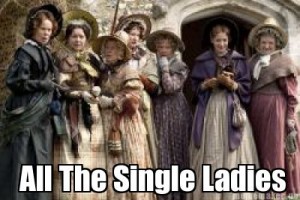 Last night, as Kelly and I were falling into a not-very-deep literary conversation, I decided I’d expand the conversation by posting the following question on Facebook:
Last night, as Kelly and I were falling into a not-very-deep literary conversation, I decided I’d expand the conversation by posting the following question on Facebook:
Alyx Dellamonica –15 hrs · Toronto ·
Edward Ferrars and Henry Tilney are getting no love at all, and Mr. Knightly, from Emma, gets one hat-tip. There’s some quiet praise for Edmund Bertram.
The two contenders are: Colonel Brandon and Frederick Wentworth… and it looks like Brandon’s pulling ahead.
There’s been some talk about whether the fire of fannish love, in each case, was sparked by the literary characters or by their portrayals in film and TV. Is Darcy the undisputed cock of the Austen walk solely because of Colin Firth? Will Alan Rickman lock the number two spot for Colonel Brandon? Even Edmund Bertram’s supporters mention Johnny Lee Miller in a yum-yum favorable context.
Speaking of delicious Darcy goodness, have you all seen The Lizzie Bennet Diaries?
Your thoughts on this burning issue are always welcome.



One difference betwixt then and now, and particularly between then in Jane Austen’s social circle and now, is that the basic character test for being serious and responsible, holding a steady job, didn’t apply then. The men Austen’s characters are considering as marriage fodder don’t have to work; they’re gentlemen of leisure living on inherited capital, usually in the form of land or investments in government securities. With some light estate management, perhaps, but you really had to be a wastrel drunk/gambler or profoundly incompetent to blow a substantial landed fortune in Regency England.
True – there were different rules then, in terms of what was valued and what wasn’t.